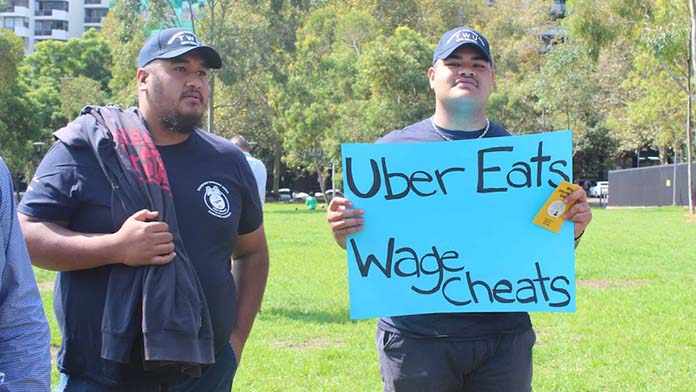In September the Albanese Government introduced its Closing Loopholes Bill to Parliament. The Bill is the second tranche of Labor’s industrial relations legislation and follows last year’s Secure Jobs, Better Pay legislation.
The ACTU has largely played the role of cheerleader for the Bill. But the changes are minor and will do little to address the cost-of-living crisis and insecure work. And they will do nothing to loosen the draconian anti-strike laws.
The key parts of the Bill are the amendments to the Fair Work Act to introduce minimum standards for workers in the gig economy and close loopholes that allow companies to employ labour-hire workers on pay and conditions below those of their direct employees. The Bill also includes a range of other changes such as criminalising wage theft and small changes to casual conversion rights.
The Liberal Party and employer groups have decried the Bill. The Minerals Council’s Tania Constable called them “some of the most extreme, interventionist workplace changes that have ever been proposed in Australia”.
Yet the Financial Review reported that Labor bent over backwards to make concessions to bosses during consultations in August, noting, “Business lobbyists remarked there was movement every day with the department over the laws.”
Industrial relations Minister Tony Burke hit back in a speech at the National Press Club. Tellingly, he argued that employer claims that Labor’s previous tranche of IR legislation would lead to more strikes had come to nothing.
Compared to the 128,000 days lost to industrial action in the last quarter of the Morrison government, he said, “the figures for the most recent quarter for this government” showed far fewer strike days. There were just 7700 strike days in the March quarter and 10,200 in the June quarter this year.
This is no achievement. The tight restrictions on the right to strike have tied workers’ hands in the face of the cost-of-living crisis.
Unions have begun bargaining on behalf of childcare workers employed at 64 centres, demanding a 25 per cent pay rise, in the first use of the multi-employer bargaining process introduced under Labor’s laws. But this has depended on the agreement of employers—partly in the hope the federal government will put up the money to fund higher wages.
The new Bill is more of the same.
Labour hire is one major focus. Burke says, “When a business agrees on rates of pay in an enterprise agreement, and then asks labour hire workers to work for less—this is a labour hire loophole.”
But the United Workers Union has pointed out that “many thousands” of workers will not benefit under the proposed laws because they require an application for a Fair Work order to make business comply. The government could have simply made it illegal for labour hire to undercut enterprise agreement conditions in the first place. Small business will also be exempt.
In the face of employer criticism, Burke has argued that the changes will have “negligible” economic impact as they will impact only an estimated 67,000 workers. This is cold comfort for many—there are 600,000 labour hire workers in Australia, according to the ACTU.
Gig work
The other major change in the Bill is the creation of minimum standards for a new category of “employee-like” workers.
This is aimed at addressing the dire pay and conditions of gig work for the likes of Uber. Until now these workers have been classed as “independent contractors”, without minimum rates of pay or other rights.
The changes will mean Fair Work can set some minimum standards in areas including payment terms, deductions, working time, representation and cost recovery. The legislation also addresses unfair dismissal and allows collective agreements for platform workers where platform operators agree.
But the changes fall well short of delivering the same rights as other workers. Uber pushed hard to make sure there were no rights to penalty rates, overtime, minimum shifts, leave or breaks. Labor gave them what they wanted.
Other aspects of the Bill are similarly tepid. Commonwealth industrial manslaughter laws are playing catch up. Sustained campaigning by the CFMEU has seen all states and territories other than Tasmania either introduce industrial manslaughter laws or indicate they will do so.
The casual conversion changes put the onus on vulnerable casuals to apply for conversion rather than the employer being obliged to classify workers properly to begin with. This means employers can’t be pursued for back pay even if a conversion application succeeds.
The new laws will be delayed in the Senate until next year at least. But if workers want to keep up with the cost-of-living and address the root of insecure work they will have to fight now rather than holding their breath for Labor’s changes.
By Adam Adelpour






